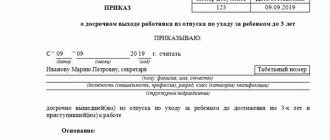07 September 2020
Adviсe
An employee is entitled to a monthly benefit even if he went on parental leave but continues to work part-time or from home. However, if the working hours are slightly reduced, the court may find the payment unlawful, and indicating remote work will not help
Is it possible to work on maternity leave for up to 3 years?
The Labor Code of the Russian Federation states that a woman, while on leave given to her to care for a child for a period of up to 3 years, has every right, on her own initiative, to go to work ahead of schedule. This is evidenced by Articles 256 and 93 of the Labor Code of the Russian Federation.
Combining parental leave and work is possible only in case of part-time employment , that is, with a reduced working day or week, or remotely.
In this case, the woman should be provided with comfortable working conditions. If the previous position and place of work are not suitable for the young mother, she can be transferred to another place with appropriate responsibilities. Her place remains until her baby turns 3 years old.
Important! In addition to a paid break for rest and lunch, an employee with a baby under 1.5 years old must be given time to feed him . Such a break should last at least half an hour with a feeding interval at least every 3 hours.
In such cases, remuneration is based on the hours worked by the woman and the amount of work she performs. The temporary work schedule for the period of performance of work duties during parental leave is drawn up based on the wishes of the employee herself, but is agreed upon with management.
A young mother must express her request for early employment in writing in the form of an application.
Working part-time and taking child leave, a woman has the same rights as other employees. The period she worked is summed up into the total length of service, and at the end of the year, mother is entitled to annual leave based on the days worked.
Will the benefit continue for up to 1.5 years?
By returning to work before the end of the “children’s” leave, a woman does not lose monthly payments for the child.
If a young mother, without officially leaving maternity leave, goes to work part-time, she continues to be paid a state benefit for caring for a baby up to 1.5 years old.
At the same time, she will also receive a salary for the hours worked . The termination of benefits occurs after the child turns 1.5 years old.
Important! Returning to work full time and working week is considered the end of child leave, which will entail the termination of payments.
Also, a young mother cannot simultaneously receive child care benefits and get another job with the conclusion of a new employment contract. The only exception is part-time work, which is legal and will not be a reason for withdrawing benefit payments.
Is it possible to work during maternity leave?
The expectant mother has the right to continue working and receive payments in accordance with the employment contract (ET). Moreover, starting from the 30th week (28th in case of multiple pregnancy), she has the right to go on leave under the BiR. In a standard situation, it is provided for 140 days; deductions are paid based on average earnings for the last 2 years in a lump sum.
Let's consider several situations related to labor during the period of economic development:
the employee did not provide the manager with a sick leave certificate from the antenatal clinic, confirming the right to B&R. She continues to work and receives the salary due to her. At any time from the moment the labor and labor formally begins, the employee can change her mind and apply for leave on a certificate of incapacity for work. In this case, the benefit will be paid according to the actual number of non-working days. For example, if a woman worked for 15 days, they will not be covered by both benefits and wages. Only the salary will be paid, and benefits will begin to be deducted based on the calculation (140-15) = 125 days;- a similar situation will occur if the employee decides to graduate from labor and employment prematurely. For example, after the birth of the child, she did not wait and immediately went to work. 30 days of the allotted vacation were spent, with another 110 left. Then 30 days already spent are covered by benefits, and for 110 days the woman is obliged to reimburse insurance contributions. The funds are not transferred to the employer personally, they go towards her salary, that is, for some time the employee can work for free in order to reimburse the costs.
Expert opinion
Irina Vasilyeva
Civil law expert
The legislation does not prohibit carrying out labor activities during the period of economic development.
Can an employer refuse?
According to Russian legislation, namely the Labor Code and the articles mentioned above, a woman, while on leave after the birth of a child and until he turns 3 years old, has every right to go to work until the end of this leave.
In this case, the manager must accept her application and give her the opportunity to start working part-time. She must also be provided with working conditions no worse than those in her position and without risks to her health.
In addition, the letter from Rostrud number 697 “On the application of labor legislation” states that the manager does not have the right to refuse his employee to go to work on a shortened working day. In case the employer neglects the law, you should ask to justify such refusal in writing.
If the employer does not express a desire to accept an application from a woman on care leave, it is necessary to write a complaint addressed to him and submit it to the labor authorities or the court. For unlawful actions, the manager will be held administratively liable .
What to do if the employer refuses?
According to the labor legislation of the Russian Federation, an employer cannot refuse an employee to return to work early from maternity leave. If for some reason an employee is denied her previous position, this is a violation of rights.
In this case , the employee whose rights have been violated must write a complaint to the labor inspectorate and (or) file a claim in court (paragraph 15, article 356 and article 392 of the Labor Code of the Russian Federation; paragraph 1, part 1, article 22 of the Civil Law Code of the Russian Federation).
How to register an exit?
To return to work early while on leave granted for a child, you must write an application addressed to the director of the labor organization. It must indicate under what conditions the young mother wants to work (with a shortened working day, part-time week or remotely at home). It is also important to indicate exactly what days or hours the woman wants to work.
After submitting the application, an agreement is concluded between the employee and her manager, which further stipulates the conditions for the performance of her work. This is the period of her temporary employment, working hours and responsibilities, as well as payroll.
Based on an application accompanied by a formalized agreement, the manager must issue an order for the woman to go to work during her maternity leave.
What documents are needed?
The first thing to write to register for going back to work during the vacation period is an application. It is compiled in any form.
The application must indicate:
- Position and full name of the manager;
- Position and full name of the employee;
- Information about the order for leave to care for the baby;
- Working conditions (part-time, week, work from home);
- Hours and days of work;
- Date and signature of the employee.
Important! The Labor Code does not stipulate that an application must be submitted in advance. Therefore, submitting an application is free .
applications for part-time work - word:
an agreement is concluded between him and the young mother . This document can also be drawn up in any written form. It is written to agree on the terms of a part-time employee's work, as well as her working hours, days, wages and working conditions.
The agreement must indicate:
- Number of the additional agreement to the employment contract (date and number of the contract);
- Working days and weekends;
- Opening hours;
- Rest breaks and lunch;
- Feeding time for the baby (if he is not yet 1.5 years old);
- Changes in job responsibilities, if any;
- Date of entry to work and end date of the temporary employment contract;
- Information about the organization (its full name and address);
- Full name of the head;
- Full name and passport details of the woman on vacation;
- Date and signatures of both parties.
The last document is an order to enter service on a part-time basis with the condition of maintaining payment of benefits for up to 1.5 years. It is also compiled in free form in accordance with the regulatory documents of the organization.
In the order, in addition to the basic information and purpose of the document, you must accurately indicate the employee’s working hours by hours and days, the calculation of wages according to them and the effective date of the working period during the vacation. The order at the end is signed by everyone indicated in the document and certified with a seal.
order to establish part-time work for an employee and maintain benefits for up to 1.5 years - word:
Based on the order, the corresponding designations are placed on the working time sheet - how to indicate maternity leave and part-time work.
Returning to work during parental leave
Labor legislation provides for such work modes as short-time and part-time work. It should be taken into account that reduced working hours are a guarantee for certain categories of workers depending on the nature of the work they perform and are established by regulations. And part-time working time is considered to be working hours less than normal, established by agreement of the parties to the employment contract. As you know, part-time work can be provided to employees for various reasons, but in this article we will analyze the situation when a young mother, while on maternity leave, decided to go to work.
By virtue of paragraph 1 of Art. 9 of Law N 165-FZ, relations under compulsory social insurance arise with the insurer (employer) for all types of compulsory social insurance from the moment of concluding an employment contract with the employee; for insured persons - for all types of compulsory social insurance from the moment of concluding an employment contract with the employer. According to paragraphs. 6 paragraph 2 art. 12 of Law N 165-FZ, insurers are required to pay certain types of insurance coverage to insured persons upon the occurrence of insured events in accordance with federal laws on specific types of compulsory social insurance. Clause 1 of Art. 22 of Law N 165-FZ provides that the basis for the assignment and payment of insurance coverage to the insured person is the occurrence of a documented insured event.
One of the types of insurance compensation is a monthly child care allowance (Article 7, paragraph 8, paragraph 2, Article 8 of Law No. 165-FZ).
As a general rule, parental leave is granted until the child reaches the age of three years (Part 1 of Article 256 of the Labor Code of the Russian Federation). During the period of maternity leave, the employee retains her place of work (position) (Part 4 of Article 256). A monthly child care benefit is paid to insured persons (mother, father, other relatives, guardians) who actually care for the child and are on parental leave, from the date of granting child care leave until the child reaches the age of one and a half years (h 1 Article 11.1 of Law No. 255-FZ, Part 1 Article 14 of Law No. 81-FZ). A woman, while on maternity leave until the child reaches the age of one and a half years, receives a benefit in the amount of 40% of average earnings, on which insurance contributions for compulsory social insurance are calculated in case of temporary disability and in connection with maternity, but not less than the minimum amount of this benefits established by Art. 15 of Law No. 81-FZ.
For your information . From 01/01/2013 the minimum amount of monthly child care benefit is set at:
— RUB 2,453.93 - caring for the first child;
— 4,907.85 rub. - caring for the second child and subsequent children.
The right to a monthly child care allowance is retained even if the person on appropriate leave works part-time or at home, and in the case of continuing education (Article 13 of Law No. 81-FZ). Also part 3 of Art. 256 of the Labor Code of the Russian Federation establishes that a woman can work on a part-time basis while on maternity leave. That is, the legislation of the Russian Federation guarantees the preservation of the right to receive a monthly child care benefit for an insured person who has taken the specified leave at his place of work and works part-time. This is also stated in the Letter of the Federal Social Insurance Fund of the Russian Federation dated August 10, 2010 N 02-02-01/08-4003.
Let us recall that clause 8 of Regulation N 111/8-51 provides for the following labor regimes established when working part-time:
- reducing the duration of daily work (shift) by a certain number of working hours on all days of the working week;
— reducing the number of working days per week while maintaining the normal duration of daily work (shift);
- reducing the duration of daily work (shift) by a certain number of working hours while simultaneously reducing the number of working days per week.
These work schedules may include dividing the duration of daily work into parts, for example, in the morning and evening.
When establishing part-time work schedules, the length of the working day (shift), as a rule, should not be less than 4 hours, and the working week - less than 20-24 hours, respectively, for a five- and six-day week.
Part-time work can be set for any period. Changing the terms of the employment contract determined by the parties, including transfer to another job, is allowed only by agreement of the parties. An agreement to change the terms of an employment contract determined by the parties is concluded in writing (Article 72 of the Labor Code of the Russian Federation).
Note ! While on maternity leave, a woman can work simultaneously both under a civil contract and part-time or at home. At the same time, she retains the right to receive a monthly child care benefit, since remuneration under a civil law contract is not wages by virtue of Part 1 of Art. 129 Labor Code of the Russian Federation.
In practice, the following question often arises: what length of working hours can be set? This issue is not regulated by law. The parties to the employment contract must independently determine the length of the working day (working week) that is acceptable to them. The FSS, in Letter dated March 22, 2010 N 02-03-13/08-2498, recommends that on the issue of working hours, persons working part-time should be guided by the standards established by the Labor Code of the Russian Federation, as well as Regulation N 111/8-51.
To answer this question, let us turn to judicial practice. The FAS Decree UO dated December 10, 2008 N F09-9217/08-C2 states: even if each working day of an employee is 12 minutes less (working hours are 39 hours per week), then her work schedule corresponds to the characteristics of part-time work. In addition, clause 8 of Regulation No. 111/8-51 is of a recommendatory, not mandatory nature. Accordingly, in this case, the employee retains the right to receive a monthly child care benefit. A similar conclusion is presented in the Resolution of the Federal Antimonopoly Service UO dated 07/08/2009 N F09-4211/09-S2.
In the Resolution of the FAS DVO dated September 19, 2012 N F03-3632/2012, when considering the case, the court indicated: if an employee is established on a part-time working schedule with a working week of 35 hours, a working day of 7 hours, while she partially worked 30 hours a week, partially 7.2 hours a day (which corresponds to a 36-hour working week), then this work mode meets the characteristics of a part-time working day (each working day is reduced by 40 minutes) and a shortened working week (36 hours instead of 40 hours), due to than she retains the right to receive a monthly child care benefit.
FAS NWO, in Resolution No. A21-620/2012 dated November 23, 2012, having analyzed the circumstances of the dispute, indicated that the employee had the right to receive a monthly child care benefit, since the conditions provided for by the current legislation for receiving such a benefit were met:
— the existence of an employment relationship is confirmed;
— granted (according to the order) partially paid leave to care for a child up to one and a half years old;
- in connection with going to work during the period of the specified vacation, the order established a part-time working schedule: 8 hours from Monday to Thursday (from 8.00 to 17.00), 7 hours on Friday (from 8.00 to 16.00), that is, 39 hours a week.
Based on this, the employee’s work schedule meets the criteria of a shortened workweek (39 hours instead of 40 hours) with payment in proportion to the time worked.
At the same time, the court rejected the FSS’s arguments about the employee’s abuse of his right and about the creation of an artificial situation in order to receive benefits, since the loss of earnings due to a reduction in working hours is insignificant compared to the amount of benefits received. In addition, it is noted that the current legislation does not provide for restrictions on the payment of child care benefits or the possibility of the Social Insurance Fund recalculating the amount of this benefit depending on the decrease in working hours.
There are also many disputes regarding payment for part-time work: the Social Insurance Fund, in order not to pay benefits, argues that issuing wages in full when working part-time is unreasonable, since Art. 93 of the Labor Code of the Russian Federation establishes proportional payment.
For example, in the Resolution of the Federal Antimonopoly Service of the Russian Federation dated 02.09.2010 N A29-10887/2009, the judges found that in accordance with the order and additional agreement to the employment contract, an employee who is on maternity leave for a child up to one and a half years old was given a part-time working day (with a reduction working day from 7.2 to 6.2 hours). At the same time, her wages were calculated and paid for a full working day. The organization, in turn, did not provide evidence that the employee worked part-time and that the payment of child care benefits to her until he reaches the age of one and a half years from the Social Insurance Fund was made justifiably. Accordingly, the court refused to satisfy the organization's request to accept the benefit for offset.
However, the Federal Antimonopoly Service of the Russian Federation, in its Resolution dated September 19, 2012 N F03-3632/2012, when considering the issue of issuing wages in full when working part-time, indicated that by virtue of Art. 132, 135 of the Labor Code of the Russian Federation, establishing the amount of wages for an employee falls under the exclusive powers of the employer, while the right to receive child care benefits for children up to one and a half years old is a federal guarantee in the field of social security. Thus, the argument was rejected that the employee did not have the right to reimbursement of funds from the Social Insurance Fund, since this, in turn, is a restorative measure aimed at compensating the employee’s lost earnings due to the need to care for a child under one and a half years old. But the worker’s earnings were not lost.
In the Resolution of the FAS UO dated May 26, 2010 N F09-3400/10-S2, the court did not take into account the arguments of the FSS that since the provision of parental leave, the working conditions of individuals and their remuneration have not changed, that is, loss of earnings didn't happen. However, as it turned out during the trial, the employees were assigned part-time working hours (based on the documents submitted - orders, employment contracts, time sheets), and wages were paid in proportion to the time worked.
We would also like to draw your attention to the Resolution of the Federal Antimonopoly Service of Ukraine dated March 13, 2012 N F09-1216/12, which addresses the following situation. Based on the order, the employee, while on maternity leave, began working on a part-time basis. According to an additional agreement to the employment contract, she was allowed to perform labor duties under the conditions of working from home with the establishment of a work schedule, while maintaining the right to receive child care benefits until the child reaches the age of one and a half years. Please note that when working from home, part-time working hours are not established. At the same time, the court concluded that the woman who worked at home continued to actually care for her child, as a result of which she had the right to receive benefits from the Social Insurance Fund. The court rejected the FSS's argument that working from home should only be related to material production. After all, labor legislation:
— does not contain restrictions regarding the circle of persons who can work from home;
- presupposes the freedom of the parties to establish a home-based form of organizing the labor process.
In addition, it is noted that the possibility of working from home is determined by the employer himself, taking into account economic feasibility and the real possibility of carrying out work at home. Based on the above, the courts concluded that the organization’s dishonesty and the direction of its actions to obtain unjustified benefits by the controlling body have not been proven.
According to Art. 258 of the Labor Code of the Russian Federation, a working woman who has children under the age of one and a half years, upon her application, is provided, in addition to a break for rest and food, additional breaks for feeding the child at least every three hours, lasting at least 30 minutes each. At the same time, breaks for feeding are provided to women regardless of whether they are breastfeeding or not. These breaks are included in working hours and are subject to payment in the amount of average earnings.
At the request of the woman, breaks for feeding the child (children) are added to the break for rest and nutrition, or in aggregate form are transferred both to the beginning and to the end of the working day (work shift) with a corresponding reduction.
That is, when assigning part-time work to an employee who has a child under the age of one and a half years, the employer must take into account that she takes breaks for feeding the child for one hour a day. In this case, part-time work will be considered the sum of working time, including breaks for feeding the child, amounting to less than 40 hours per week under normal work hours.
Is a person working part-time and caring for a child until he is one and a half years old entitled to it?
The duration of the working day immediately preceding a non-working holiday is reduced by one hour (Part 1 of Article 95 of the Labor Code of the Russian Federation). This standard applies to all employees, regardless of the length of their working hours, including part-time workers. This is due to the fact that part-time work does not entail any restrictions on labor rights (Part 3 of Article 93 of the Labor Code of the Russian Federation).
At the same time, in continuously operating organizations and in certain types of work, where it is impossible to reduce the duration of work (shift) on a pre-holiday day, overtime is compensated by providing the employee with additional rest time or, with the consent of the employee, payment according to the standards established for overtime work (Part. 2 Article 95, 153 Labor Code of the Russian Federation). It should be borne in mind that the employee can choose between increased pay or rest on another day.
The length of service that gives the right to annual basic paid leave does not include the time of leave to care for a child until he reaches the age established by law (Part 2 of Article 121 of the Labor Code of the Russian Federation). However, if during the period of parental leave an employee works part-time or at home, then this rule does not apply to him, since the period of work on a part-time schedule is included in the length of service, which gives the right to the next paid leave with preservation place of work (position) and average earnings (Article 114, Part 1, 4, Article 122, Part 4, Article 124 of the Labor Code of the Russian Federation).
However, paid leave can only be granted after parental leave, since an employee cannot be on two leaves at the same time. Moreover, when calculating average earnings, the salary accrued for time worked, including payment for part-time work, is taken into account.
According to Part 2 of Art. 256 of the Labor Code of the Russian Federation, parental leave can be used in full or in parts by the child’s father, grandmother, grandfather, other relative or guardian actually caring for the child. That is, a woman who is on parental leave until the child reaches the age of three years can, at any time convenient for her, leave this leave early, and subsequently also at any time resume leave after a break resulting from going back to work, and the employer has no right to refuse to satisfy her applications.
You can use this right, in particular, if it is necessary to grant the employee study leave. In other words, in order to exercise the right to study leave, she must interrupt her maternity leave. To do this, you should write two applications with the same date: about early return to work and about granting study leave. In this case, the accrual of child care benefits is interrupted and student leave is issued, for which average earnings are calculated and paid. At the same time, during the period of employment of the employee, child care can be provided by another person who is actually caring for the child (father, grandmother, grandfather, other relative or guardian) during this period and who has taken appropriate leave.
After the end of study leave, a woman can again exercise the right to parental leave in accordance with Art. 256 Labor Code of the Russian Federation.
A woman working part-time, in case of illness, has the right to temporary disability benefits, since she is an insured person (clause 1, part 1 and part 2, article 2 of Law No. 255-FZ, part 3, article 93, 183 Labor Code of the Russian Federation). In case of temporary disability of persons on parental leave until the child reaches the age of three years, working part-time or at home, a certificate of incapacity for work is issued on a general basis (clause 23 of Procedure No. 624n). Accordingly, the employer is obliged to pay both temporary disability benefits and child care benefits. This norm remains the same in the event of illness of the child who is actually being cared for.
The monthly child care allowance is not paid only when the receiving mother is unable to care for the child due to her illness. In this case, the right to this benefit can be exercised by another family member who is actually caring for the child during this period. At the same time, the right to assign and pay benefits can be transferred from one family member to another, depending on which of them actually takes care of the child. Based on the above, the mother of the child must interrupt her leave to care for him, since she is assigned temporary disability benefits (clause 42 of Order No. 1012n). To do this, she must submit applications for termination of benefits and that she is interrupting maternity leave. If, for health reasons or for other reasons, the child’s mother cannot submit this application in person, it can be accepted from another family member upon presentation of a document proving his identity and relationship.
The peculiarity of accounting in the case under consideration is that the time sheet must contain a combination of marks, since the employee is simultaneously on maternity leave (that is, released from performing work duties) and performing her job function. So, if part-time working time is established at the initiative of the employee, the letter code “I” or the digital “01” is entered in the timesheet, indicating under the code the duration of time worked for each working day in accordance with the terms of the additional agreement to the employment contract.
If an employee works part-time, additional non-working days are indicated in the timesheet as days off.
In this case, throughout the entire parental leave, the letter code “P” is entered (form 0504421).
To make two marks in the time recording form used by the institution, you can enter an additional line.
In addition, we would like to remind you that if there is no standard letter code to designate a certain type of working time, then a new designation can be introduced by order of the manager. This possibility is established by Appendix 5 to Order No. 173n. This feature is used, for example, when reflecting feeding breaks. Despite the fact that breaks for feeding a child are equated to working time, they are calculated in the amount of average earnings and therefore must be reflected separately in the working time sheet.
Is it possible to work part-time while on maternity leave?
Let's take a closer look at the procedure for working during maternity leave on a part-time basis. The normal duration of a week of work is 40 hours (Part 2 of Article 91 of the Labor Code of the Russian Federation), and a working day is 8 hours (Article 94 of the Labor Code of the Russian Federation). According to the above, part-time work is considered to be when an employee works less than the standard specified above (letter of the Federal Service for Labor and Employment dated 06/08/2007 No. 1619-6).
The procedure for working part-time has its own characteristics:
- Having decided to work part-time, the employee must submit a corresponding application to the employer (Part 3 of Article 256 of the Labor Code of the Russian Federation). In accordance with Part 4 of the same article of the Labor Code of the Russian Federation, the employer is obliged to maintain a workplace for the maternity leaver.
- Going to work on maternity leave on a part-time basis is formalized by signing an additional document. agreement to the main employment contract under Art. 72 Labor Code of the Russian Federation. The start of work of a maternity leaver is formalized by issuing an appropriate order. The basis for this is the employee’s statement.
- Also, the employee may at any other time (until the child reaches the 3rd birthday) decide to continue caring for the child by terminating the employment relationship on a part-time basis. In this case, he submits a corresponding application to the employer and signs an additional document. agreement that it stops working in this mode.
Since maternity leave is granted to an employee until the child’s third birthday, the employer can only hire a temporary employee for the position of maternity leave for this period. When an employee decides to return to work after maternity leave (for example, on a part-time basis), the employer terminates the employment contract with the temporary employee in accordance with Part 3 of Art. 79 Labor Code of the Russian Federation.









